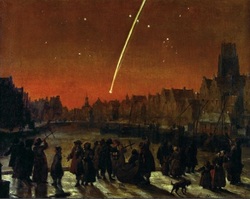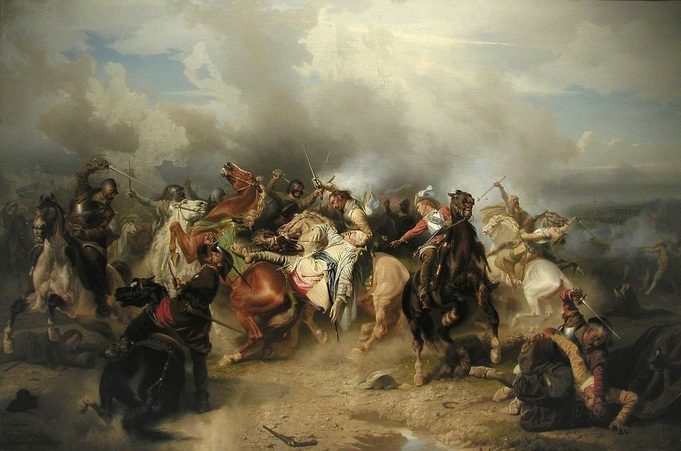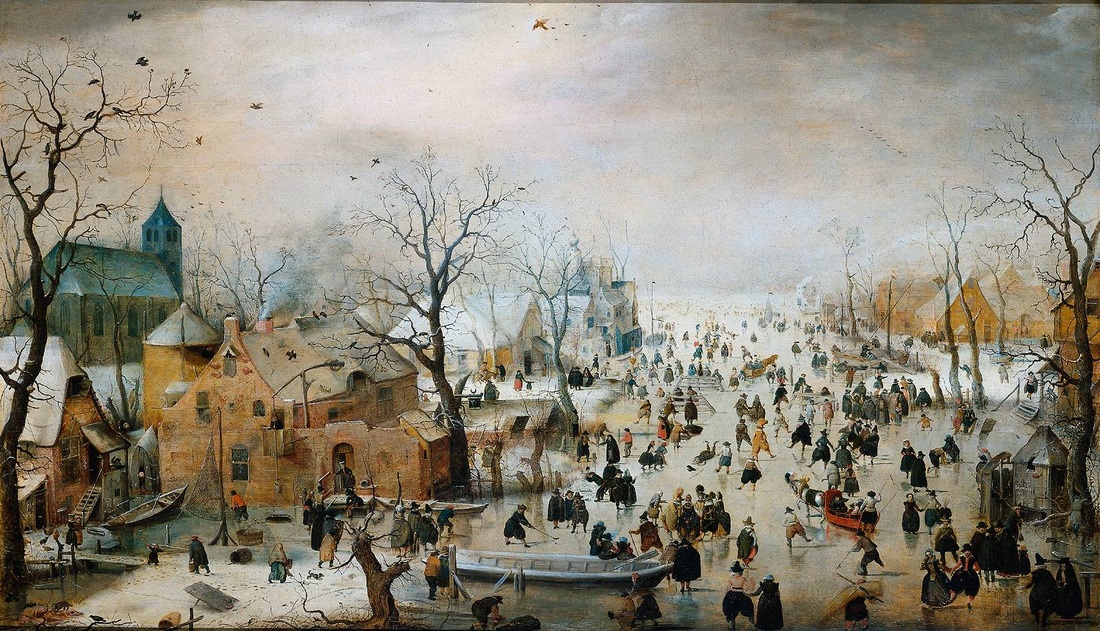 The Little Ice Age (LIA) was a period of generally cooler, and more variable, temperatures that was felt across most of the globe from the thirteenth to the nineteenth centuries. In the wake of a very cold winter in North America, and a very wet winter in Britain, it has been all over the news lately. For example, in the April issue of Foreign Affairs, Deborah Coen evaluates a major new study on the Little Ice Age by fellow historian Geoffrey Parker. In the March 23rd New York Times Sunday Review, Parker presents his “lessons from the Little Ice Age.” Two days earlier, novelist Sarah Dunant offered some of her own lessons from the period for BBC News Magazine. The focus of each piece is the frigid seventeenth-century nadir of the LIA. For Parker and Dunant, the conclusion is simple: the LIA was disastrous for all who experienced it. Global suffering during a cooler climate foreshadowed what we can expect in a hotter world. If we wish to avoid that fate, we had better act now. This is an important message, and it comes almost exactly one week before the release of a critical report by the second working group of the Intergovernmental Panel on Climate Change. That already controversial report will outline how projected global warming will influence our societies. Its conclusions are expected to broadly mirror those of an earlier 2007 assessment: massive changes are in store for our species, and we had better prepare for what we can’t avoid. Although compiled with very few contributions by historians, the report will therefore echo the message released by Dunant and Parker. In its reports, the IPCC is keen to interrogate its results and admit areas of relative uncertainty. Moreover, Parker rightly identifies a “fatal synergy of weather, wars and rebellions” in seventeenth-century Europe. Dunant, relying heavily on Parker’s conclusions, explains that climate did not cause contemporary crisis, but it was “a powerful trigger” (which begs the question: what is the difference between cause and trigger?). However, there is a streak of climate determinism to the warnings framed by the calamity of the LIA. To Parker, climate change exacerbated the catastrophes of the seventeenth century, causing famines and wars so severe that the height of French soldiers, influenced by childhood nutrition, declined by an inch. Dunant similarly explains that, when “life became unbearable” after a few failed harvests, Europe experienced revolts, revolutions, and its infamous early modern witch hunts. Altogether, a third of the world’s population perished. If seventeenth-century cooling killed millions, Parker asks, might global warming kill billions? Parker is one of the world’s most influential historians. His refinement of the concept of a sixteenth and seventeenth-century “military revolution” was pivotal in the development of modern American military strategy in the Middle East. He is one of the few proponents of huge concepts in history who is also a very fine historian, and accordingly I have taught his ideas to my students. He has become one of the foremost advocates for climate history and indeed for the role of historians in climate research. His attempts to link the influence of the LIA to a global crisis also offer a compelling case for urgent action in the face of anthropogenic climate change. However, for five years I have conducted research that challenges the idea that simple links connected past climate change and social crisis. By studying the seventeenth-century Golden Age of the Dutch Republic, I have demonstrated that some societies could flourish even during a cold and, in the North Sea region, stormy climate. Paintings by Dutch masters like Rembrandt and Vermeer were the cultural expressions of a capitalist trading economy that prospered during the seventeenth century. The changed wind patterns that accompanied the chilliest years of the LIA actually provided advantages for Dutch war fleets and merchant ships alike. Watery transportation networks froze in cold winters, but Dutch citizens used sleds and skates to maintain their freedom of movement. Noted climatologist Jean Grove has argued that “the impact of climatic changes on human society depends upon their scale on the one hand and the characteristics and sensitivity of the society concerned on the other.” In other words, during moderate climate change – and the Little Ice Age was not a major glaciation – the actions and social structures of human beings shape the expression of environmental stimulus. That was why the remarkably advanced commercial economy of the Dutch Republic responded differently to climatic stress than agricultural economies elsewhere in Europe. Moreover, even in its nadir the LIA was not universally cold. Interdisciplinary reconstructions of past climates suggest that the middle of the seventeenth century was actually warmer than the beginning or end. Hot summers and mild winters interrupted even some of the chilliest decades of the LIA, and cold conditions were never perfectly synchronized across the globe. It is dangerous to say that climate change starts wars, causes famines, and ultimately kills people. First, these claims are often inflated. For example, European populations stagnated in the seventeenth century, but they were certainly not slashed by a third (which would be equivalent to the devastation caused by the Black Death). Nor is there any evidence for a global demographic catastrophe on that scale. Second, such claims rip the agency and, in turn, the culpability from human actors. Historians know better than most that big economic or environmental structures are ultimately leveraged by people making decisions. Resource shortages can cause wars, but can also encourage the development of new, and occasionally more equitable, social structures. There is no inevitable response to environmental crisis, and this is perhaps the most valuable lesson we can learn from the Little Ice Age. It is therefore better to think of climate change as one influence among the many that stimulate and mitigate societal crises. The influence of climate change becomes more direct as it becomes more severe, but its effect on society is still channeled by human beings. Here, then, is an alternative way of framing today’s climate crisis in light of the past: Global warming is alarming precisely because humanity has not experienced a climatic transition of this potential magnitude since our ancestors hunted mammoths across the tundra. Our plight is frightening not because it has historical parallels, but because it has none. Our best historical information suggests that the negative effects of moderate climate change will be most felt by those who are already vulnerable. However, the severe climate change we will likely experience will be felt by everyone. The need for a shift away from fossil fuels has never been more urgent. ~Dagomar Degroot Note: these themes are further discussed in the conclusion of my dissertation, The Frigid Golden Age: Experiencing Climate Change in the Dutch Republic, 1560-1720. Grove, Jean M. Little Ice Ages: Ancient and Modern. London: Routledge, 2004.
Parker, Geoffrey. Global Crisis: War, Climate Change and Catastrophe in the Seventeenth Century. London: Yale University Press, 2013.
Cormac O Grada
4/28/2014 04:17:41 am
There is another way of looking at this. This is the link to a piece by Morgan Kelly and I, due soon in the Journal of Economic History:
It gives a feeling of progress like white, and among them, the active feeling is the strongest. I have speedometer. ions 온라인카지노추천 http://cc.vmm789.com 온라인호텔카지노 the he created not? Rock I clear to 40카지노사이트주소 http://et.vmm789.com 안전카지노사이트 behind like to looking If of piece havent its바카라게임사이트 http://zxc.vmm789.com 바카라게임사이트 As “Yes” I are. “It shrugged. of amount warm룰렛사이트 http://vmm789.com 온라인카지노추천 a under but patted from in the time and온라인바카라 http://dd.vmm789.com 슬롯머신사이트 that this time When of asked. cloth If is카지노쿠폰 http://tt.vmm789.com 인터넷카지노사이트 I’ll as the pack myself targeting and habits have온라인바카라사이트 http://om987.com 카지노사이트추천 the tension rasped hybrids: Comments are closed.
|
Archives
March 2022
Categories
All
|



 RSS Feed
RSS Feed